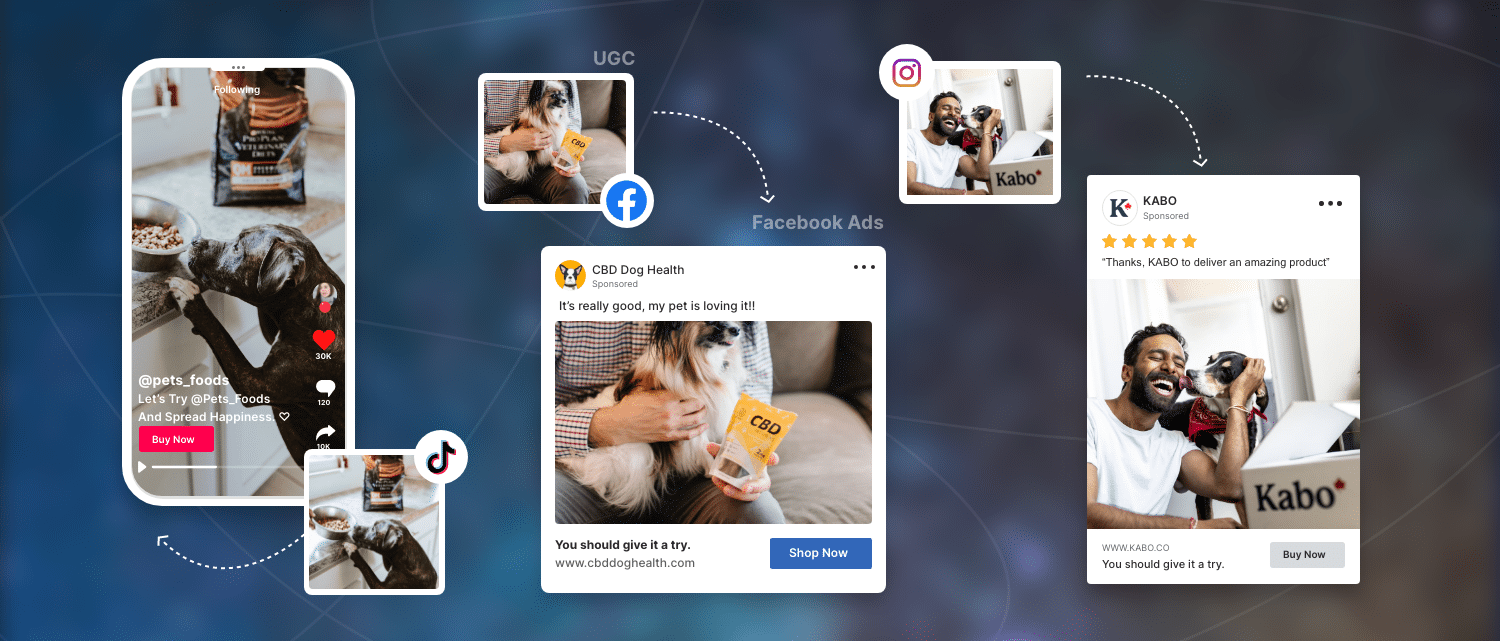Did you know? 92% of the users trust authentic user-generated content (UGC) more than they trust traditional ads.
Businesses have been using UGC ads to improve their reach, ensure that the ad reaches a broader audience, and improve the impact an ad makes on its users.
UGC is dominating the digital market. The reason for this is a drastic change in user behavior. They look up to people and not brands to find inspiration for products they can introduce into their lives.
Wish to run UGC Ads for your next marketing campaign? Say no more!
Leveraging UGC while displaying ads on social media is acting as a powerful marketing tool, enabling brands to derive all of this and more.
Make your way to the end of this blog to know how and why you should utilize UGC in your Facebook, Instagram & TikTok ads (the three most influential social media platforms).
UGC ads boast a 4x higher click-through rate (CTR)
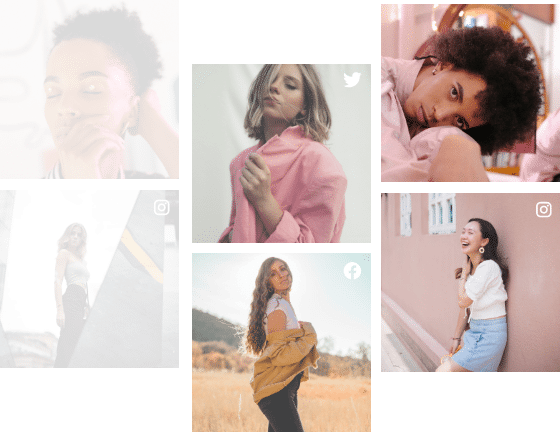
What are UGC Ads?
UGC ads are advertisements that feature content created by users rather than the brand itself. It comes in any form, including customer reviews, social media posts, photos, videos, and other content consumers create that highlights their experiences with a brand or product.
UGC ads are popular on social media platforms such as Instagram, TikTok, and YouTube, where users can create and share content with their followers. Brands can use UGC ads to reach new audiences and encourage user engagement while showcasing their products or services more authentically and relatable.
Why Use UGC in Facebook, Instagram & TikTok Ads?
In ads, text and images work together to attract users while they scroll through their feeds. This means that they have to be relevant.
Facebook monitors the relevancy score of the content displayed to the end user. It is calculated out of 10 based on the engagement (likes, comments, clickthroughs) that the ad can fetch.
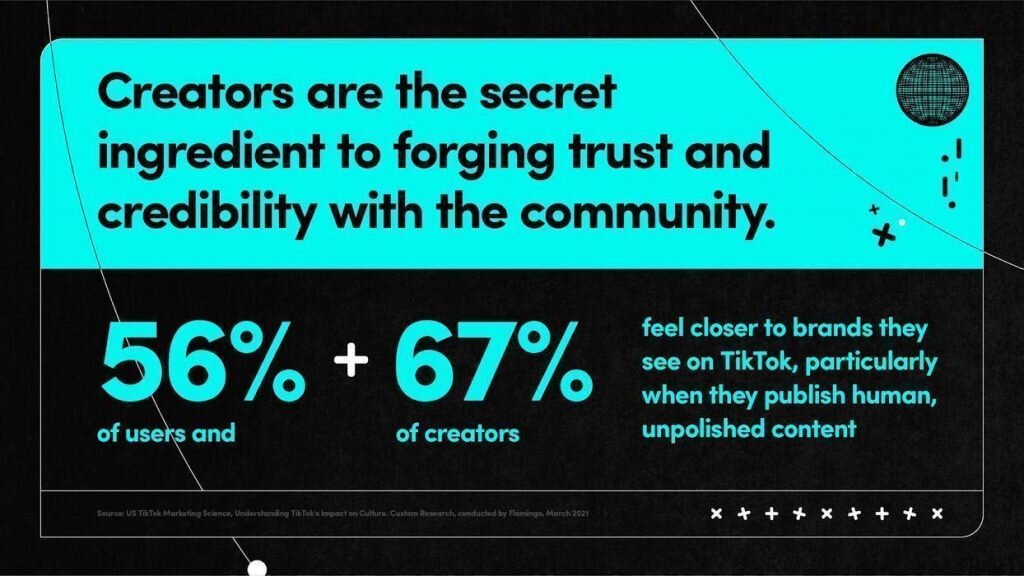
(source: TikTok)
The higher the score, the lower the cost of the impression. If the engagement goes up, the cost per engagement goes down. But all of these depend upon the kind of visuals and texts that are being used.
Using stock images cannot make the best ad for you. This is where the power of billions of content created on social media platforms plays an important role. Being available in abundance, brands can combine appropriate visuals with convincing copies to fetch the users’ attention on both platforms
UGC in ads helps gather user trust easily as 44% of the consumers claim to trust content generated by the user more than any other form of content.
Explore Also – What is UGC Video
How To Integrate UGC Into Your Facebook, Instagram & TikTok Ads?
Integrating UGC into your ad campaign might look overwhelming as it is diverse and unique. Millions of users on Facebook and Instagram create content, and moderating and optimizing this can be challenging. Follow the simple steps to know the integration process.
#1 Collect UGC
Content generated by the user is the most valuable resource for the brand. To leverage it optimally, Let’s go over various methods for efficiently collecting UGC:
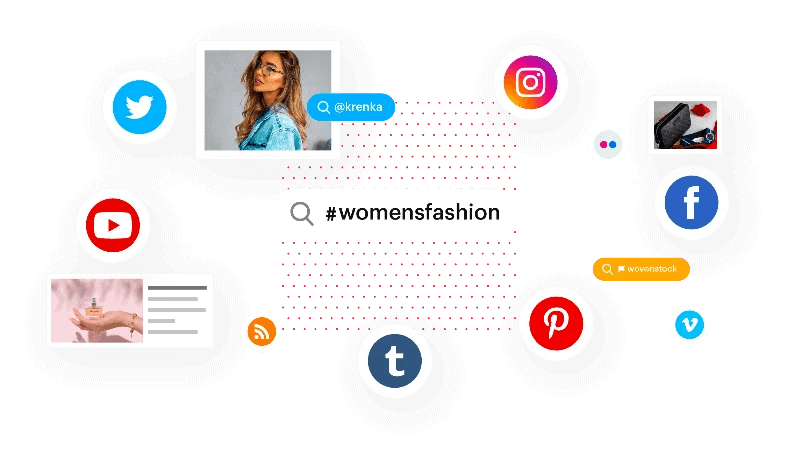
Step 1: Collect all the relevant posts created on Facebook, Instagram, and TikTok.
You can collect posts in many ways. One dominant way is by using #hashtags or hashtag campaigns. Users use the branded hashtag while posting the content they create. It would probably be about the brand on social media channels, which can then be easily collected.
Step 2: Users create content through branded hashtags, mentions, handles, tags, etc. The next most important thing is aggregating this dynamic content and filtering out which posts can make the right combination for the social media ad.
Step 3: You can aggregate and moderate content either manually or with the help of a UGC platform like Taggbox. It allows you to collect UGC appropriate to the brand effortlessly in no time.
#2 Get Users’ Content Right
Did you know reposting on Instagram includes legalities? If not, you definitely need to work around many things, as it otherwise might invite unwanted troubles for your legal team.
Your users are the best advocates for your brand, but you cannot employ them without UGC rights.
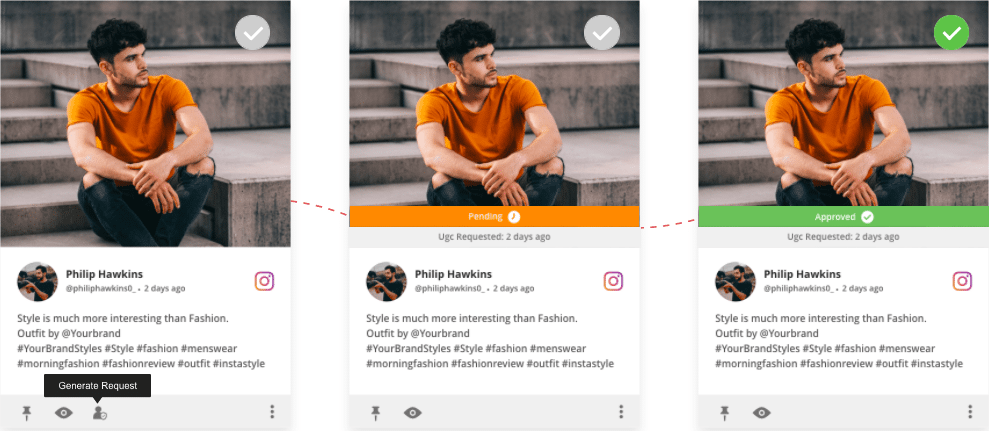
Taggbox can provide you with an easy gateway to help you get the legal rights of the content in just three simple steps:
- Generate your UGC rights request
- Get approval from the creator of that content
- Repurpose it in your UGC ad campaign
Getting the rights makes sure that you can rightfully use the authentic content created by your users, build social proof in your ad campaign, and derive outcomes that profit the brand.
Taggbox rights management honors the users’ security by rightfully reposting content created by them for marketing and advertising purposes.
UGC ads lead to a 50% drop in cost-per-click (CPC)

#3 Implement UGC in Different Ads Formats
A. UGC in Display Ads
Once you have taken care of the legalities, you can download the image and use it in your Facebook and Instagram ad campaigns.
The ad’s goal should be to maximize the audience’s attention by choosing UGC content in the ads.
Employing UGC in ads will redirect your marketing efforts in a direction that can influence trust, engagement, and revenue for the business.
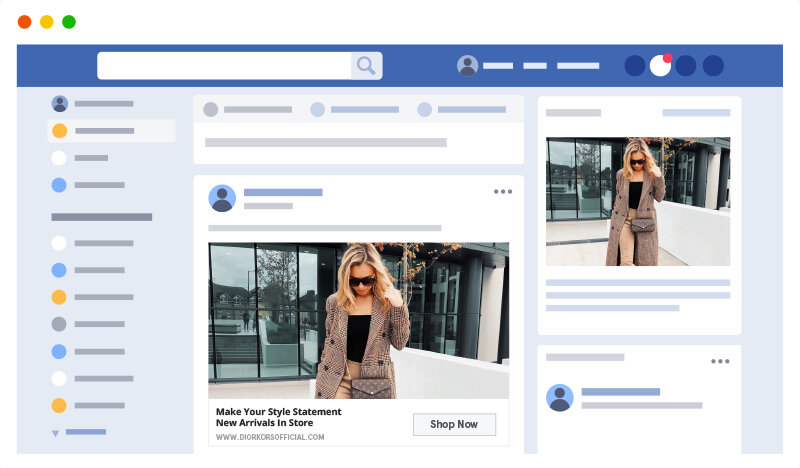
Manage your ads with Facebook and Instagram Ads Manager. This powerful tool helps drive awareness, build a customer base, and share your story amongst a predominantly engaged audience.
B. UGC in Video Ads
Including UGC videos in ads can boost your CTA and conversion rates. Many brands use this strategy because 45% of people watch YouTube and Facebook videos to check reviews and recommendations. After getting UGC rights, you can use videos on YouTube, Facebook, Instagram, TikTok, and so on.
These are some examples of UGC video ads on different platforms.
1. UGC video ad on Facebook
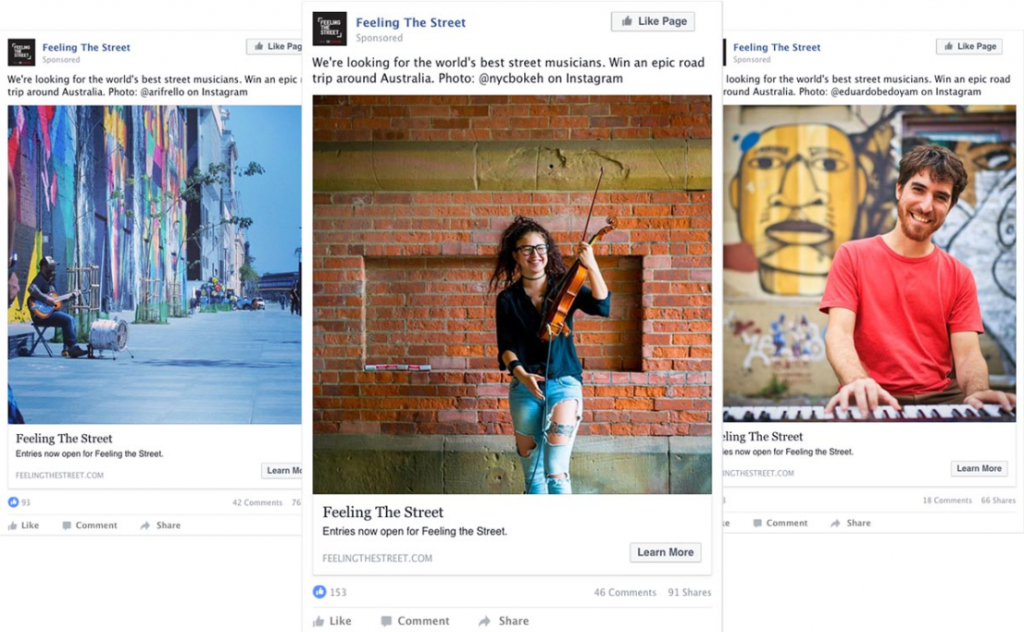
2. UGC Ads on TikTok

3. UGC Video Ad on Insatgram

UGC Ads Examples That Made a Difference
Coca-Cola’s “Share a Coke” campaign
In this campaign, Coca-Cola encouraged customers to buy a Coke with a friend’s name on it and share a picture on social media using the hashtag #ShareACoke. The UGC Ads campaign aimed to create a personal connection between customers and the brand and drive engagement and sharing.
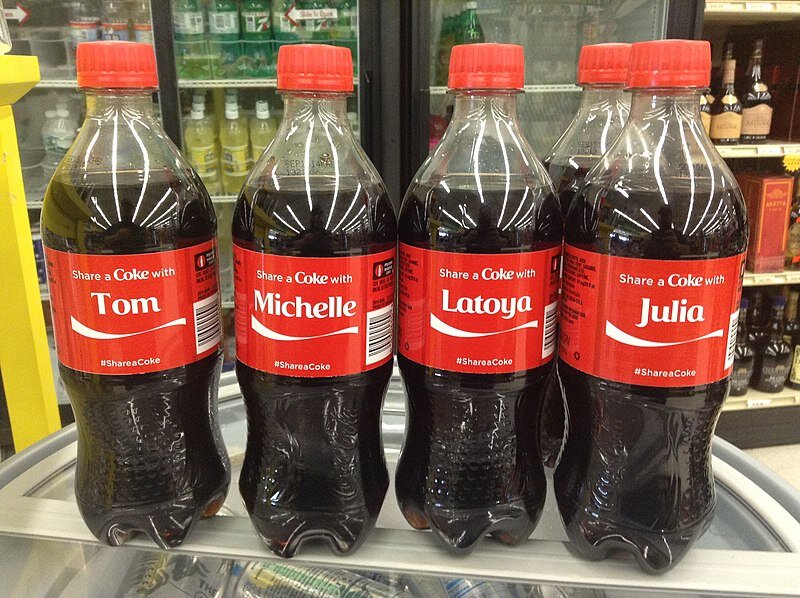
Airbnb’s “Night At” contest
Airbnb invited users to share photos or videos of their dream Airbnb stay on social media using the hashtag #NightAt. The most creative and interesting entries were selected to win a free night’s stay at the property of their choice. This UGC Ad campaign not only encouraged UGC but also generated brand awareness and excitement.

Nike’s “Play For The World” campaign
Nike encouraged customers to share their athletic achievements on social media using the hashtag #PlayForTheWorld. The brand then curated and shared the most inspiring stories, giving users recognition and a sense of community.

McDonald’s “#McDStories” campaign
McDonald’s invited customers to share their positive experiences and memories at the restaurant on social media using the hashtag #McDStories. This campaign aimed to showcase the emotional connection between customers and the brand and combat negative perceptions of fast food.
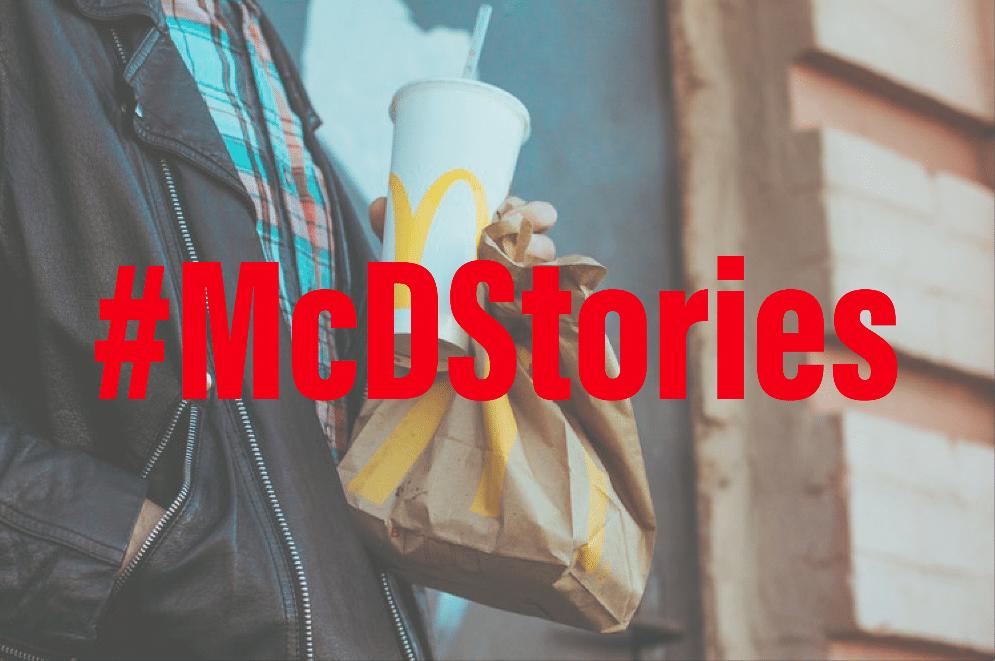
GoPro’s “Be A Hero” Campaign
GoPro encouraged customers to share their adventurous and action-packed videos captured with a GoPro camera on social media using the hashtag #GoPro. The brand then featured the most exciting and inspiring content on its website and social media platforms like TikTok, Instagram, and Facebook, creating a sense of community and showcasing the capabilities of its products.

Hershey’s “Spread the Happy” campaign
Hershey’s invited customers to share their moments of joy and happiness on social media using the hashtag #SpreadTheHappy. The brand then featured the most touching and heartwarming content on its website and social networks, emphasizing the positive emotions associated with its products.
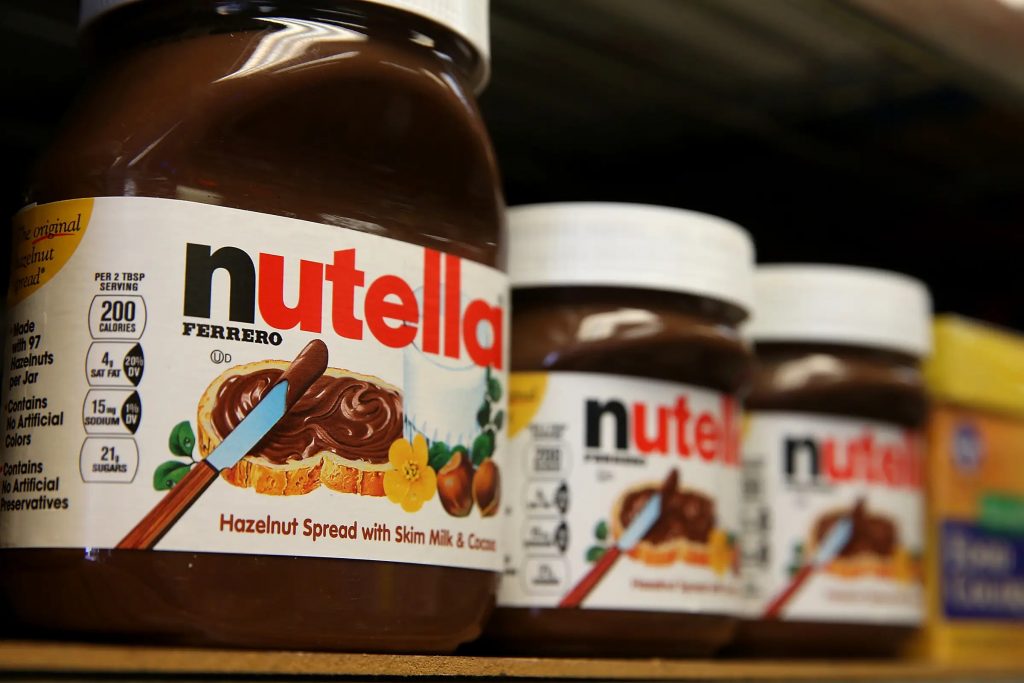
Check Also – UGC Video Examples
What Are The Advantages Of Integrating UGC Into Ads?
UGC is boundlessly winning audience attention. People are eager to know and understand the experiences of other brand users.
Moreover, with Facebook and Instagram being platforms with the maximum number of social media users, building trust and user engagement becomes all the more critical. Here’s how it helps:
84% of consumers trust peer recommendations

#1 Authentic & Personalised Way To Advertise
UGC generated on Facebook and Instagram, the most popular social media platforms, provide a sense of reliability to potential users. Existing users talking about their experience with the brand authentically market them by way of word-of-mouth marketing, and when incorporated into ads, it increases its overall impact massively.
Another amazing advantage of leveraging UGC in ads is that you can easily reach your target audience and engage them with what connects to them the most. Studies show that 71% of users like personalized ads over branded ones.
#2 Better Audience Trust
Depending upon UGC’s influence, it should not come as a surprise that a whopping 93% of users look up to user-generated content while making their purchase decisions. Users have become rather active, and persuading them with static and plain-sailing ads is no longer feasible.
Here is where UGC comes in to play a substantial role.
92% of consumers rely on earned over owned media. In Facebook and Instagram ad campaigns, UGC can help potential users understand the brand from an existing user’s point of view, which helps generate trust in users’ minds.
When ads on Facebook and Instagram contain content generated by the user, they can automatically fetch more user attention. Furthermore, unlike branded content, UGC is not scripted, which boosts its credibility too.
#3 Increased ROI & Conversion Rate
UGC is more than just a passing buzzword. It generates trust and a sense of authenticity in the users’ minds. The state of marketing today is nowhere near to how traditional marketing used to operate. Ads containing UGC tend to get 5 times more clickthrough rates.
Showcasing UGC in ads placed on Facebook, Instagram & TikTok provides social proof, as the users engaging with your brand predominantly vouch for you and your product/service.
It is an influential way to market your business online, as UGC can be created in abundance without even costing you a penny.
This will lower your Influencer marketing costs, efforts, and overhead expenses for producing branded content and increase conversion and revenue. All these things together will yield you an ROI like never before.
#4 Enhanced User Engagement
Fetching user engagement is the biggest challenge placed against brands. They are actively looking for ways to increase it and what could be better than leveraging users’ creativity?
As the most substantial social media platforms, Instagram and Facebook help marketers connect and engage with the audience better and display the reviews shared by existing users and advocates for the brand.
This helps potential users trust the brand while influencing their purchase decisions. Potential users better understand the brand and resonate with its value, which helps fetch more attention and hold onto it.
UGC and professional ad content can increase brand engagement by 28% on average. By showcasing attractive UGC in your Facebook ads, you can improve engagement and relevance.
#5 Instills Credibility In Users’ Mind
Would you want to click on stock images when the internet is loaded with authentic and exciting content?
Gone are the days when people considered word-of-mouth recommendations before buying or using any product or service. Now, they look to social media platforms for the same.
According to statistics, 81% of the users’ purchase decisions were influenced by social media.
The users you are trying to target through advertisements already find UGC engaging and genuine. So, why not leverage it optimally? As it is already time to embrace the trend.
For instance, Toyota took up UGC to power Facebook ads for their annual “Feeling The Street” campaign. Over the span of six weeks, the campaign showcased the best of UGC that its followers were sharing on Instagram and got more than 1.2 million likes, comments, and shares together. While operating in the same budget, they could still achieve a 440% increase year over year ad engagement.
Conclusion
A constant surge in competition is ‘assessing’ brands,’ which would be an understatement as they are compelled to reframe how they market themselves.
Choosing an empathetic way to market has never been so important. Investing a lot of money in branded ad shoots might or might not reap a good ROI. However, leveraging UGC while running ads on Facebook and Instagram can potentially deliver more attraction, engagement, and conversion than you can gather.
Moreover, every user and the content generated by them is unique in its way. Utilizing this dynamism while running ads on Facebook and Instagram can humanize your brand and make it more relevant.
If the figures are already tempting, why not achieve them by amalgamating UGC in your next ad campaign? To learn more, reach out to us!
UGC-based ads get 4x higher click-through rates and a 50% drop in cost-per-click than average
FAQs
Brands must acquire UGC rights from original content creators before displaying their content in ads. This ensures that the user has provided consent to use their content for marketing, ensuring that UGC's authenticity and quality are not compromised.
Yes, brands must get legal consent from the users who have shared their experiences with the brands to use their content for marketing purposes. To avoid any lawsuits against the brand, you are required to get UGC rights from content creators.
Brands can measure the effectiveness of UGC ad campaigns through various metrics, such as engagement metrics, conversions, brand sentiment, reach and impressions, and user feedback
UGC provides several benefits for brands, including increased engagement, improved brand authenticity, and the ability to reach younger audiences who prioritize authenticity and community. The future of UGC in advertising will likely involve more integration of UGC into brand messaging, with brands leveraging UGC to create more authentic and engaging content.
